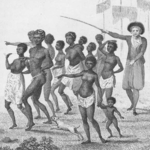‘British Capital, Industry and Perseverance’ versus Dutch ‘Old School’?: The Dutch Atlantic and the Takeover of Berbice, Demerara and Essequibo, 1750-1815
DOI:
https://doi.org/10.18352/bmgn-lchr.8226Keywords:
Dutch West India Company (WIC), Commercial relations, Entrepreneurs, Economic History, Slavery, Shipping, MerchantsAbstract
Recent historiography has reconsidered the idea that the Dutch role in the early modern Atlantic was of little significance, particularly in comparison to the accomplishments of the Dutch East India Company (voc) in Asia. Revisionist studies have emphasised that in spite of the limited and fragmented nature of the Dutch Atlantic ‘empire’, the Atlantic contribution to the Dutch economy was significant and possibly even greater than the voc’s share. Moreover, this scholarship stresses the vital role of Dutch Atlantic colonies (Curaçao and St Eustatius), (partly Jewish) networks and individuals in connecting the various subempires of the Atlantic. While Oostindie subscribes to many of these conclusions, he argues against excessive revisionism. His analysis of the development of the lesser Dutch Guianas, adjacent to Suriname, is used as a counter-weight to this revisionist impulse. He demonstrates that the spectacular economic and demographic development of these colonies was due mainly to British and (British) American involvement culminating in the eventual British takeover of ‘Guiana’.Downloads

Downloads
Published
Issue
Section
License
Authors who publish with this journal agree to the following terms:
a) Authors retain copyright and grant the journal right of first publication with the work simultaneously licensed under a Creative Commons Attribution 4.0 International (CC BY 4.0) that allows others to share the work with an acknowledgement of the work's authorship and initial publication in this journal.
b) Authors are able to enter into separate, additional contractual arrangements for the non-exclusive distribution of the journal's published version of the work (e.g., post it to an institutional repository or publish it in a book), with an acknowledgement of its initial publication in this journal.
c) Authors are permitted to post their work online (e.g., in institutional repositories or on their website) prior to and during the submission process.
Authors are explicitly encouraged to deposit their published article in their institutional repository.








